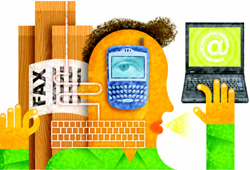I learned this lesson myself recently while working with the administrative department head for one of my clients. He communicated with me exclusively by e-mail and yet I persistently tried calling him on the phone whenever I received his e-mails, hoping to speak live. I was becoming frustrated because it is not my preferred method of communication. Our relationship almost came to an end when his boss told me that things weren’t going well because they weren’t receiving information from me in a timely fashion. I instantly realized that my efforts to encourage communication on my terms were hampering the growth of the relationship. Once I started engaging in “e-mail conversation,” things went smoother and the relationship was back on firm ground. Certainly other salespeople have suffered through the same learning process by resisting the change brought on by the technological revolution or, worse, failing to learn and losing a client.
On a more fundamental level, sales-people mismanage the use of technologies such as voicemail and e-mail so frequently that business productivity in general is hampered. Everyone has been victimized by the e-mail conversationalist that casually drops an electronic note to talk about even the most mundane topics, misusing e-mail as a conversation tool. Less obvious to some sales-people is the damage they do to their reputation by leaving poorly worded or rambling voicemails to prospects. In the end, your ability to utilize all the tools of the technological revolution will be key to your business survival.
Managing Technology In order to efficiently manage your communications in an evolving world of technology, consider the following:
- E-mail is not a conversation. The language of text messaging has suddenly become so pervasive that people are ignorant of the real people in the world around them. In the end, people buy from people. If you have a conversation to make, strive to make the personal touch by phoning or speaking face to face. Save e-mail communications to send documents, verify details of business, and communicate specific information relevant to business. Unless you are working with a client that wants to communicate exclusively by e-mail, use this tool judiciously.
- Not every incoming communication is an emergency. As more communication technologies evolve, you will continue to be bombarded with e-mails, voicemails, text messages, phone calls, and the like that will insist you take immediate action to resolve an “emergency.” Strive to be patient in the face of adversarial technology communications and remember not to create unnecessary emergencies for others.
- Cell phone activity is not necessarily productivity. It’s that simple. Just talking on the phone does not translate into productivity. Find time to be quiet and plan. Reduce your dependence on always “being in touch” and strive to use the cell phone to create legitimate productivity.
- If you can fax it, you often can e-mail it. Paper creates clutter and, in a complex world, the desire to become more organized is prevalent. Clarify with clients their preferred method for receiving information and utilize the fax only when appropriate.
- Embrace the changing technologies. Communication technologies will become more complex, not less, in coming years. Force yourself to become multilingual and fluent in the “languages” of phone, fax, and computer in a changing world, or you will risk losing more sales battles to multilingual competitors.
Sales Leaders recognize that the best way to manage technology is to let the technology work for them. They balance their use of technology by embracing its power while, at the same time, not permitting it to control their lives. Knowing how to use all the various forms of technology will give you an edge. But when all is said and done, remember that one sales communication tool will never become obsolete—the handshake.

